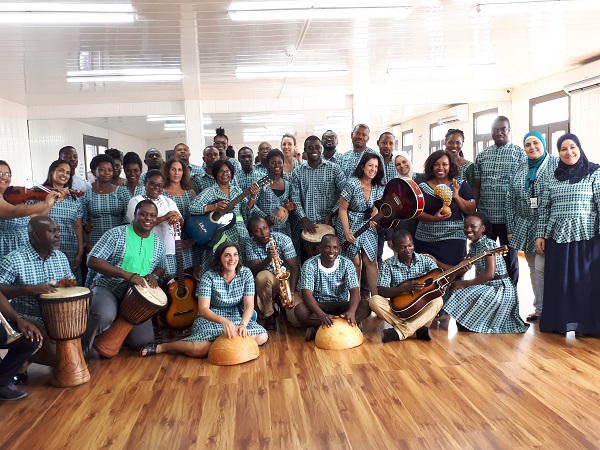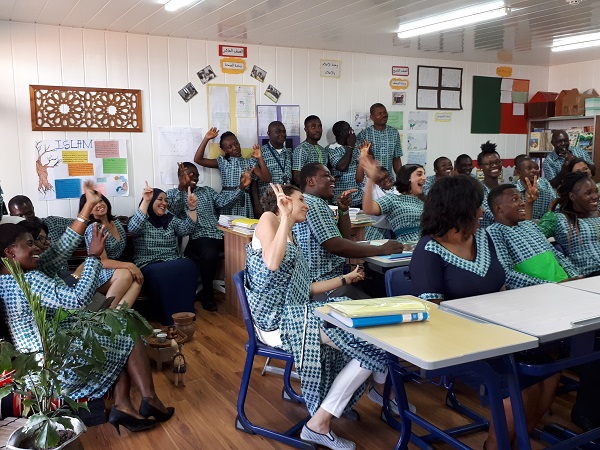What does it take to Educate 21st Century Learners?


What does it take to educate 21st Century Learners? In today’s scenario, teaching and learning is more innovative than it has ever been. Not only from the experiential learning point of view, but the kinds of interactions that students have with teachers are more collaborative rather than a top-down, blackboard approach. Teachers, now Facilitators, learn as much from the pupils as they teach. The Pool of knowledge and understanding in 21st Century Academia is really, for all.
On the 23rd of February 2018, ARIS held a Professional Development Day (Teacher Training) for all of the teachers across, PYP, MYP and DP programs, in the Primary and Secondary School Campuses. All staff was also advised to wear ARIS Wear on that day, not only because it was ‘Friday wear’ Day but also because it evokes the feel of a community and togetherness…And togetherness, it was!
Over the course of the Teacher training, the emphasis was on Team Building. As though the ARIS Team dynamic was not already evident, reflecting on students’ and community growth, each department had their own innovative ways of presenting their points to put in, on the team building exercises.
As part of the Secondary School PD, the first presentation was given by the Head of Secondary, Madam Alpana Mukherjee, which encouraged all staff to be mindful of themselves, of their goals, to pass through stress and to instill this practice onto students inside as well as outside the classroom. It is important to stop for just a moment and prioritize your own mental, physical and emotional well-being so that you can teach others the same. All the people present at the training took part in a ‘Brain Dump’ Exercise, in which, the three circles of Control (the things that you have control over), Influence (the things that influence you or you may be able to tweak), and No Control (The things you have no control over), are drawn. In doing so, it gives a visual representation of the things that we let control our emotions and mindfulness, rather than it be the other way round, most times. This is especially vital in an fast-paced, result oriented environment where teachers and staff have an over-arching responsibility to students and working with them to become the best versions of themselves.
The focus through the Teacher Training went on to other important components of being Educators/Facilitators in an IB Education system. One of them being, the ATL (Approaches to Learning) which are – Communication, Social, Self-Management, Research and Thinking skills; all of which are imperative to stand and be a part of the global community in today’s developing world. Not only are these skills for the teachers themselves, but also for the students. All of this was presented to the group by pulling on practical implications, be it every day or special occasion scenarios that we all find ourselves in.
The differentiation of each department – Math, Science, Art or Humanities was also brought to light by discussing both the advantages and disadvantages in the differentiation of departments in an education system. Each department came to the ‘stage’ with a fun and engaging way to get the whole room involved in an activity by either singing a song (Music Department) or even doing Jumping Jacks (Sports department). The point of it all brought to light the essence of IB being a student centered learning and teaching system – each student is different and has different potentials, each department and students have differentiated learning needs; teachers should encourage self confidence among the students and motivate them to learn and step out of the box.
There were also activities that highlighted the IB Learner Profiles, like Balancing a water bottle on a Newspaper between two chairs, or making music with different instruments or being risk takers and Dancing. It was also an echo of the unconventional learning processes for students part of the IB Program as well, for example, one PYP student had once said that he loved the IB because one could be assessed in creative ways.
The idea wrapping it all up was ‘Metacognition’ which encourages you to think about your thoughts, to be reflective. The awareness and understanding of the world starts from an awareness and understanding of one’s own thoughts; teamwork and team building and teaching starts from there. The point of the whole session was that even in our differences in cultural, social, educational and departmental backgrounds, each of us have ideas that multiply and come together as a big step forward in a strong, collaborative ARIS community and an inclusive and innovative Education model.